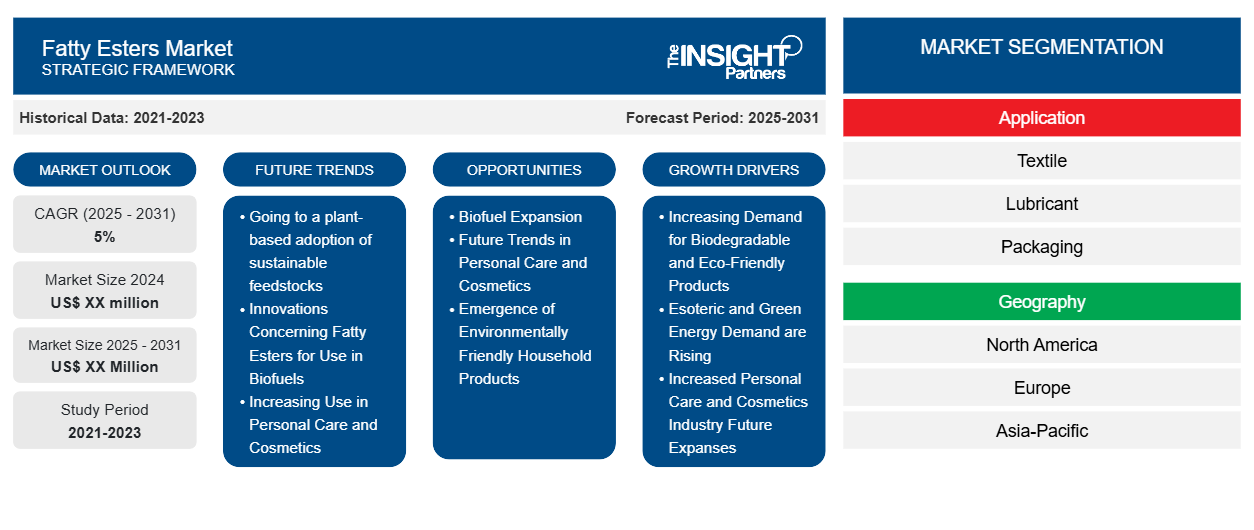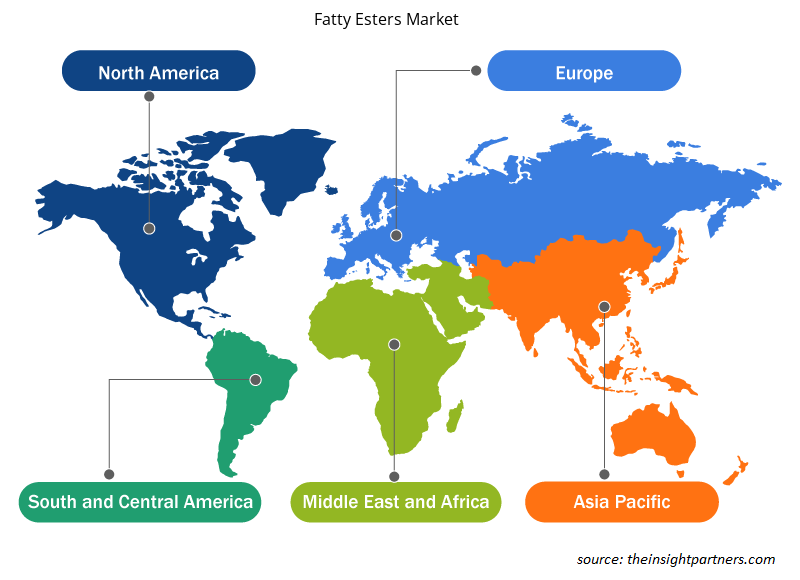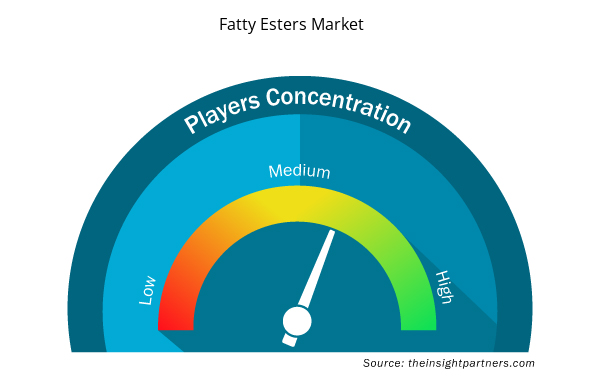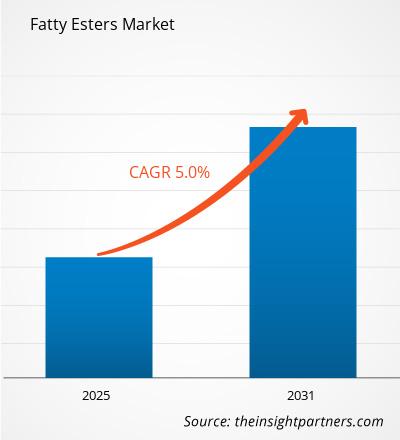The Fatty Esters Market is expected to register a CAGR of 5% from 2025 to 2031, with a market size expanding from US$ XX million in 2024 to US$ XX Million by 2031.
Fatty Esters Market covers analysis By Application (Textile, Lubricant, Packaging, Paints and Coatings, Personal Care and Cosmetics, Surfactants, Food and Beverages, Others), and Geography (North America, Europe, Asia Pacific, Middle East and Africa, and South and Central America). Fatty esters are those esters that are resulted from the combination of fat or oil with alcohol. The product is used in various pharmaceuticals, toiletries, food, cosmetics, metal working fluids, and others. They are added to cosmetics to dissolve high-polarity active ingredients and UV absorbers.
Purpose of the Report
The report Fatty Esters Market by The Insight Partners aims to describe the present landscape and future growth, top driving factors, challenges, and opportunities. This will provide insights to various business stakeholders, such as:
- Technology Providers/Manufacturers: To understand the evolving market dynamics and know the potential growth opportunities, enabling them to make informed strategic decisions.
- Investors: To conduct a comprehensive trend analysis regarding the market growth rate, market financial projections, and opportunities that exist across the value chain.
- Regulatory bodies: To regulate policies and police activities in the market with the aim of minimizing abuse, preserving investor trust and confidence, and upholding the integrity and stability of the market.
Fatty Esters Market Segmentation
Application
- Textile
- Lubricant
- Packaging
- Paints and Coatings
- Personal Care and Cosmetics
- Surfactants
- Food and Beverages
You will get customization on any report - free of charge - including parts of this report, or country-level analysis, Excel Data pack, as well as avail great offers and discounts for start-ups & universities
Fatty Esters Market: Strategic Insights

- Get Top Key Market Trends of this report.This FREE sample will include data analysis, ranging from market trends to estimates and forecasts.
Fatty Esters Market Growth Drivers
- Increasing Demand for Biodegradable and Eco-Friendly Products: Technological advances are propelling demand for biodegradable and Eco-friendly products and are among the major drivers that have ushered in change in the fatty esters market. This substrate has found an application in various indus'tries, including cosmetics and food, as well as cleavnomest rent, and fatty esters from renewable sources have a very ecological and sustainable means of meeting global sustainability criteria.
- Esoteric and Green Energy Demand are Rising: Biodiesel manufacturing is facilitated by the use of fatty esters, and since all governments across the globe are trying to tap renewable energy concepts, they are increasing that much demand for fatty esters. More and more availability of biofuels as a renewable energy resource will also be a powerful force driving the industry for fatty esters development of stringent emission regulations by governments.
- Increased Personal Care and Cosmetics Industry Future Expanses: Increasing use of fatty esters in personal care and cosmetics has been another factor that should drive the growth of the fatty esters market. According to consumers, most influencers ask for more natural, safe, and skin-friendly ingredients, which put fatty esters in emlifiers, moisturizers, conditioners, and the like as ingredients appearing in beauty products.
Fatty Esters Market Future Trends
- Going to a plant-based adoption of sustainable feedstocks: Much more plant feedstock, such as vegetable oils, is becoming an ingredient for the production of fatty esters. This trend is in response to increasing consumer demands for sustainable and green products in industries like cosmetics, food preparation, and biodiesel, which are crossed to most countries' environmental welfare ideas.
- Innovations Concerning Fatty Esters for Use in Biofuels: Most innovations in the fatty esters market are related to the developments in the area of bio-based fuels such as biodiesel. These innovations revolve around the efficiency and performance improvements of fatty esters during fuel applications owing to increasing energy demands and worldwide shifting towards cleaner renewable energy sources.
- Increasing Use in Personal Care and Cosmetics: Fatty esters are employed for purposes in personal care products because of their properties that are usually natural and non-toxic. Growing consumer demands for natural and sustainable ingredients in skin, hair, and cosmetics are driving such growth of the fatty esters market in the beauty industry.
Fatty Esters Market Opportunities
- Biofuel Expansion: Fatty esters will provide opportunities for biodiesel as their market develops with more and more customers turning towards renewable energy sources for their primary fossil fuel sources. Emissions standards are tightened and incentivized clean energy; thus, fatty esters' biofuels value increases and offers higher growth prospects in the renewable energy market.
- Future Trends in Personal Care and Cosmetics: The increased consumer trend towards natural, sustainable ingredients in cosmetics therefore yields an opportunity for fatty esters, which on their application as emulsifiers, moisturizers, and conditioning agents in skincare, haircare, and make-up ingredients drives the clean beauty filter demand for fatty esters towards personal care.
- Emergence of Environmentally Friendly Household Products: Fatty esters are fast becoming the subject of fast-growing interests in cleaning as the demand for biodegradable and non-toxic household products grows. Its use in formulating natural, eco-friendly detergents and surfactants is becoming an opportunity as an increasing number of customers tend to go for environmentally conscious cleaning solutions.
Fatty Esters Market Regional Insights
The regional trends and factors influencing the Fatty Esters Market throughout the forecast period have been thoroughly explained by the analysts at Insight Partners. This section also discusses Fatty Esters Market segments and geography across North America, Europe, Asia Pacific, Middle East and Africa, and South and Central America.

- Get the Regional Specific Data for Fatty Esters Market
Fatty Esters Market Report Scope
| Report Attribute | Details |
|---|---|
| Market size in 2024 | US$ XX million |
| Market Size by 2031 | US$ XX Million |
| Global CAGR (2025 - 2031) | 5% |
| Historical Data | 2021-2023 |
| Forecast period | 2025-2031 |
| Segments Covered |
By Application
|
| Regions and Countries Covered | North America
|
| Market leaders and key company profiles |
Fatty Esters Market Players Density: Understanding Its Impact on Business Dynamics
The Fatty Esters Market is growing rapidly, driven by increasing end-user demand due to factors such as evolving consumer preferences, technological advancements, and greater awareness of the product's benefits. As demand rises, businesses are expanding their offerings, innovating to meet consumer needs, and capitalizing on emerging trends, which further fuels market growth.
Market players density refers to the distribution of firms or companies operating within a particular market or industry. It indicates how many competitors (market players) are present in a given market space relative to its size or total market value.
Major Companies operating in the Fatty Esters Market are:
- ABITEC
- ADM
- Akzo Nobel N.V
- BASF SE
- Croda International Plc
Disclaimer: The companies listed above are not ranked in any particular order.

- Get the Fatty Esters Market top key players overview
Key Selling Points
- Comprehensive Coverage: The report comprehensively covers the analysis of products, services, types, and end users of the Fatty Esters Market, providing a holistic landscape.
- Expert Analysis: The report is compiled based on the in-depth understanding of industry experts and analysts.
- Up-to-date Information: The report assures business relevance due to its coverage of recent information and data trends.
- Customization Options: This report can be customized to cater to specific client requirements and suit the business strategies aptly.
The research report on the Fatty Esters Market can, therefore, help spearhead the trail of decoding and understanding the industry scenario and growth prospects. Although there can be a few valid concerns, the overall benefits of this report tend to outweigh the disadvantages.
- Historical Analysis (2 Years), Base Year, Forecast (7 Years) with CAGR
- PEST and SWOT Analysis
- Market Size Value / Volume - Global, Regional, Country
- Industry and Competitive Landscape
- Excel Dataset



Report Coverage
Revenue forecast, Company Analysis, Industry landscape, Growth factors, and Trends

Segment Covered
This text is related
to segments covered.

Regional Scope
North America, Europe, Asia Pacific, Middle East & Africa, South & Central America

Country Scope
This text is related
to country scope.
Frequently Asked Questions
What are the future trends in the market?
Growing interest in green chemistry is an emerging trend in the market.
Based on geography, which region is expected to record a highest CAGR in the market.
The Asia Pacific market is expected to account for the highest CAGR during the forecast period owing to the growing textile industry in the region.
Which application segment accounted for the highest share in the fatty ester market?
The lubricant application segment accounted for the largest market share in 2023.
What are the driving factors impacting the fatty ester market?
Growth of the textile industry is a key driver in the market.
What are the key players operating in the fatty ester market?
ABITEC, ADM, Akzo Nobel N.V, BASF SE, Croda International Plc, Fine Organics, Lonza, Pharma Excipients, STEARINERIE DUBOIS, and Sumitomo Chemical Co., Ltd are some of the key players operating in the market.
What is the expected CAGR of the Fatty Esters Market ?
The Fatty Esters Market is estimated to witness a CAGR of 5% from 2023 to 2031
Trends and growth analysis reports related to Chemicals and Materials : READ MORE..
1. ABITEC
2. ADM
3. Akzo Nobel N.V
4. BASF SE
5. Croda International Plc
6. Fine Organics
7. Lonza
8. Pharma Excipients
9. STEARINERIE DUBOIS
10. Sumitomo Chemical Co., Ltd

 Get Free Sample For
Get Free Sample For